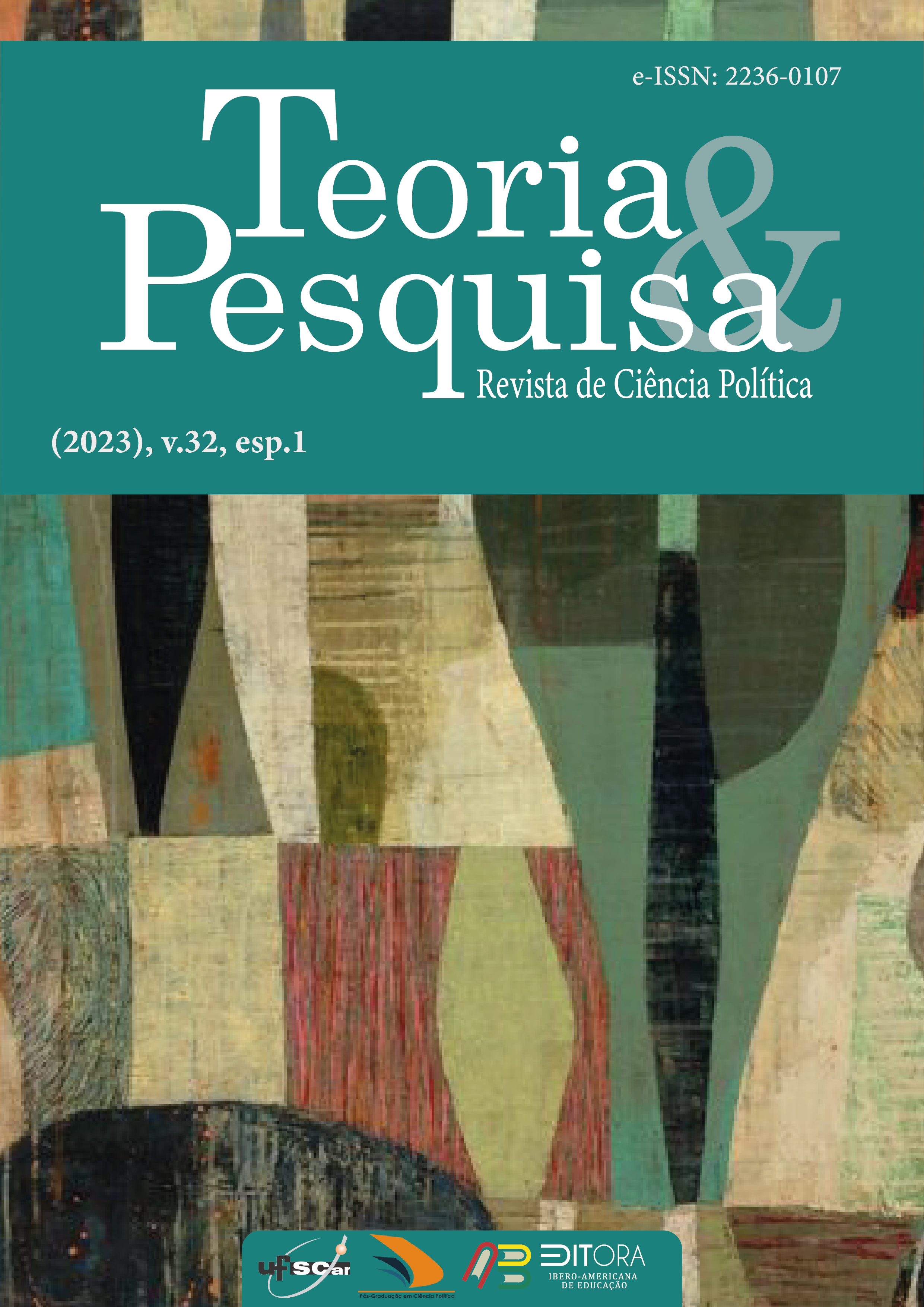Media, gender and conservatism
How the women elected in 2020 in the historical circuit of Minas Gerais build their representations in the social media
DOI:
https://doi.org/10.31068/tp.v32iesp.1.1052Keywords:
Political communication, Permanent campaign, Mediatization, Connected public sphere, FeminismsAbstract
The objective of this article is to analyze how elected female mayors in municipalities along the historical route of Estrada Real in Minas Gerais, Brazil, constructed their political representations in the connected public sphere of social media during the 2020 electoral campaign and how they maintained them in their first year of office, considering the increasing use of the permanent campaign strategy characterized by the intensification of the mediatization process. To conduct this research, a brief theoretical review was carried out on the dialectical relationship between feminism as a mass movement (FRASER, 2019) and the emergence of neoconservatism (BIROLI; MACHADO, VAGGIONE, 2020), establishing the conceptual notions of the connected public sphere (BENKLER, 2020), mediatization (HJARVARD, 2012), permanent campaign (LILLEKER, 2006), and the archetypes of female candidates (PANKE, 2016). The hybrid methodology used combines bibliographic research, documentary research, and content analysis. Preliminary results indicate no ready-made formula to ensure women's victory at the polls. Candidates with different backgrounds, political parties, and municipality sizes adopted electoral strategies that sometimes approached and sometimes distanced themselves. They all exercised caution when dealing with controversial issues related to contemporary feminism during the campaign. In the exercise of their mandate, it was the mayor of the largest city and the most left-wing party who demonstrated a greater commitment to women's historical and urgent agendas.
Downloads
References
ARUZZA, C.; BHATTACHARYA, T.; FRASER, N. Feminismo para os 99% – um manifesto. São Paulo: Boitempo, 2019.
BARDIN, L. Análise de Conteúdo. 4. ed. Lisboa: Edições 70, 2010.
BENKLER, Y. The Wealth of Networks: How Social Production Transforms Markets and Freedom. New Haven and London: Yale University Press, 2006.
BIROLI, F.; MACHADO, M. D.; VAGGIONE, J. Gênero, neoconservadorismo e democracia: disputas e retrocessos na América Latina. São Paulo: Boitempo, 2020.
BIROLI, F. O público e o privado. In: Feminismo e política: uma introdução. São Paulo: Boitempo, 2014.
COLLINS, P.; BILGE, S. Interseccionalidade. São Paulo: Boitempo, 2021. Ebook Kindle.
CASTELLS, M. A Sociedade em Rede. 3. ed. São Paulo: Paz e Terra, 1999.
DEBORT, G. A sociedade do espetáculo. Rio de Janeiro: Contraponto Editora, 1997.
FERNANDES, C. et al. Campanha permanente de Dilma Rousseff: uma análise da comunicação governamental e das estratégias eleitorais. Mediaciones Sociales, n. 15, p. 81‐100, 2016. DOI: DOI: 10.5209/MESO.54544.
FERREIRA, G. L. O direito à comunicação e as mulheres na política: ações de redistribuição e reconhecimento para o incentivo à eleição de mulheres no Brasil. 2021. 388 f. Tese (Doutorado em Comunicação) — Universidade de Brasília, Brasília, 2021.
FRASER, N. Feminismo, capitalismo e a astúcia da história. In: HOLLANDA, H. B. (org.). Pensamento feminista: conceitos fundamentais. Rio de Janeiro: Bazar do Tempo, 2019.
FRASER, N. Rethinking the Public Sphere: A Contribution to the Critique of Actually Existing Democracy. Social Text, n. 25/26, p. 56-80, 1990. DOI: https://doi.org/10.2307/466240.
GOFFMAN, E. A representação do eu na vida cotidiana. 20. ed. Petrópolis, RJ: Vozes, 2014.
HABERMAS, J. Mudança estrutural da esfera pública. São Paulo: Editora Unesp, 2014.
HJARVARD, S. Midiatização: teorizando a mídia como agente de mudança social e cultural. Matrizes, v. 5, n. 2, p. 53-91, enero/jun. 2012.
HOLLANDA, H. B. (org.). Pensamento feminista: conceitos fundamentais. Rio de Janeiro, Bazar do Tempo, 2019.
JENKINS, H. Cultura da Convergência. São Paulo: Aleph, 2013, 3Mb, ePUB.
LEAL, P. R.; PASSOS, N. A Outra Dilma Do PT: estratégias de comunicação eleitoral na disputa pela vereança no interior mineiro e a representação da mulher nas eleições 2020. In: CONGRESSO COMPOLÍTICA, 9., 2021, Belo Horizonte. Anais [...]. Belo Horizonte, 24 a 28 de maio, 2021. Disponível em: https://drive.google.com/file/d/15fuLUOy5n2gF8FCn0qk46AwQMa5p3kwW/view. Acesso em: 11 ago. 2021.
LILLEKER, D. Interviewing the political elite: Navigating a potential minefield. London: SAGE Publications Ltd, 2006. DOI:10.4135/9781446212943.
MARTINO, L. M. Teoria das Mídias Digitais: linguagens, ambientes, redes. Petrópolis, RJ: Vozes, 2014.
MARTINS, T.F. Campanha permanente, visibilidade midiática e propaganda política: um estudo das estratégias comunicacionais dos candidatos Lula/Haddad (PT) e Bolsonaro (PP, PSC, PEN e PSL) de 2015 a 2018. 2020. Tese (Doutorado) – Universidade Paulista, São Paulo, 2020.
MIGUEL, L. F. Gênero e representação política. In: BIROLI, F.; MIGUEL, L. F. Feminismo e política: uma introdução. São Paulo: Boitempo, 2014.
PANKE, L. Campanhas eleitorais para mulheres: desafios e tendências. 1. ed. Curitiba: UFPR, 2016.
PANKE, L. Candidatas guerreiras no Brasil: um estudo de caso das narrativas audiovisuais das mulheres mais votadas às prefeituras das capitais em 2020. Cuestiones de género: de la igualdad y la diferencia, n. 16, p. 459-474, 2021.
QUINALHA, Renan. “Em nome de Deus e da família”: um golpe contra a diversidade. In: SINGER, A. et al. (org.). Por que gritamos golpe? Para entender o impeachment e a crise política no Brasil. São Paulo: Boitempo, 2016.
SILVEIRA, S. A. Convergência digital, diversidade cultural e Esfera Pública. In: SILVEIRA, S. A.; PRETTO, N. (org.). Além das redes de colaboração. Salvador: UFBA, 2008.
SODRÉ, M. As estratégias sensíveis: afeto, mídia e política. Rio de Janeiro: Mauad, 2016.
TIBURI, M. Feminismo em comum: para todas, todes e todos. Rio de Janeiro: Rosa dos Tempos, 2019.












